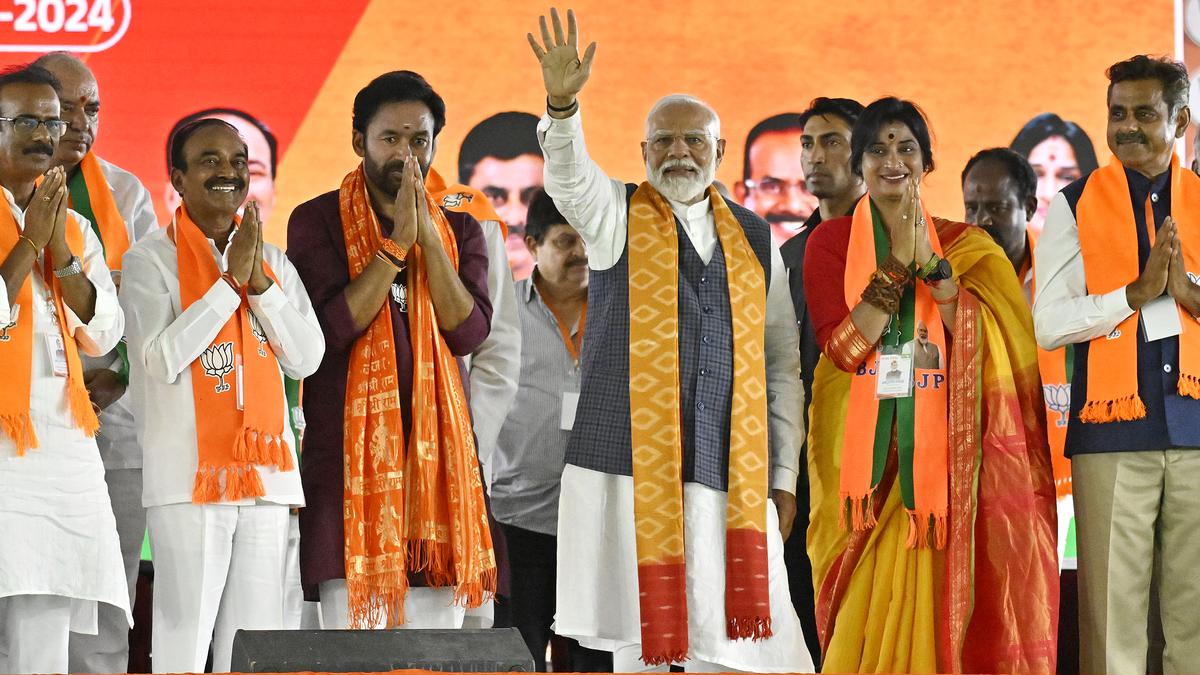
The popularity of Dakhni in Telangana Premium
The Hindu
Dakhni language in Telangana's political campaigns showcases humor, sarcasm, and cultural significance, with a rich historical background.
The campaign to the Lok Sabha elections in Telangana, especially in Hyderabad, was full of quips and comebacks in the Dakhni language. Dakhni shares the Perso-Arabic script with Urdu and Farsi and is inalienable to the Deccan plateau. particularly Hyderabad. Dakhni people and speakers are spread across the plateau and speak variants of the language in Telangana, Maharashtra, and Karnataka. There is evidence that Dakhni people speak the language in Kerala and Tamil Nadu as well. Though invariably mischaracterised as Hyderabadi, what Hyderabadis speak is simply a variant of Dakhni.
During the campaign, the siyasi jalsas, as political public meetings are called, have been filled with humour, sarcasm, and bluntness, which are all hallmarks of the Dakhni language. When Prime Minister Narendra Modi visited Hyderabad recently, political expediency naturally led him to adopt the Dakhni lexicon. At the beginning of his speech, he said, “Congress...Nakko, BRS...Nakko, AIMIM...Nakko” to huge applause from the crowd. The word ‘nakko’ means ‘no’ in Dakhni.
But the trading barbs in the language had started days before Mr. Modi’s ‘nakko’ reference. Asaduddin Owaisi from the All India Majlis-e-Ittehadul Muslimeen (AIMIM) had said as a riposte to Mr. Modi’s claim of being a “brother” to Muslim women, “Nakko re baawa, tere jaisa bhai nakko humaaku (Oh goodness, no, we don’t need a brother like you)”.
The mixing of Dakhni and political rhetoric ahead of the elections also came as a nod to Dakhni poets and poetry. The poems of Mohammed Ghouse ‘Khamakha’, Mohammed Himayatullah, Moin Amar Bamboo, and Hari Singh were adapted for caustic, yet humorous political use. Khamakha’s ‘Nai Bole To Sunte Nai (You just don’t listen)’ and Himayatullah’s ‘Kya Hai Ki Kya Nai Ki? (What is, what isn’t, who knows?)’, for instance, were repurposed for the jalsas. Mr. Owaisi reworded a poem by Khamakha thus: ‘Karne ke jo kaamaan hai/ Woh jaise ke waise hai/ Nai karne ke kaamaan karre/ Nai bole to sunte nai (The things need doing/ remain just the way they are/ The things that you shouldn’t be doing, you do/ You just don’t listen).” He also reworded Hari Singh’s ‘Hao Re?’ to say: “Saari janta ku haula banaara, hao re? Hindu, Musalmaan ku ladaara, hau re! (You’re making a fool of the public, eh? You’re instigating Muslims and Hindus, eh!)”. The words hao (yes) and nakko were used by all the parties.
With several loan words from Telugu, Kannada and Marathi, Dakhni was, and continues to be, a language of the common man since the mediaeval age. Richard M. Eaton notes that this was why the Sufis who arrived in the Deccan chose to use Dakhni as a literary medium. Some Sufis belonging to the Chishti Sufi order, and living in Bijapur in Karnataka, chose to interact with the locals, both Muslims and Hindus, in Dakhni because it was the “only vernacular of Bijapur with which both Muslims and Hindus — at least those integrated with the city — were familiar,” he says. He also observes that Dakhni, as compared to Persian, which he describes as “elitist”, could reach a larger number of people. To this day, private libraries of some dargahs in the Deccan contain mediaeval manuscripts and books written in Dakhni.
In 2005, Dakhni received a fillip after the comedy film, The Angrez, was released. The film shows the misadventures of a motley group of friends from Hyderabad who are out to exact vengeance on the angrez (foreigner), in this case an NRI, who has ostensibly offended them. While the movie became popular, created Dakhni stars, and spawned a genre of films, it caricatured Dakhni the language and the Dakhnis, especially in the old city of Hyderabad.
More recently, social media, especially Instagram, has been flooded with content in Dakhni. Several content creators indulge in linguistic hyperbole. Much like The Angrez, this too has bordered on caricaturing the language.

With over 120 interactive stalls representing CHRIST campuses across Bengaluru, Delhi-NCR, and Pune-Lavasa, the event provided valuable insights into undergraduate, postgraduate, and Ph.D. programmes. Participants also benefited from personalised career counselling sessions designed to guide their educational and career choices.










